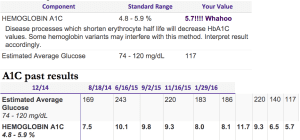08 Feb Blood Sugar: Beyond Diabetes and Hypoglycemia (Part II)

 Paul A. Goldberg MPH, DC, DACBN, DCBCN
Paul A. Goldberg MPH, DC, DACBN, DCBCN
Consultant to The Goldberg Tener Clinic
Chronic Disease Reversal
In Part One of this two-part series, we discussed the essential role of blood sugar regulation in chronic disease and how numerous issues, not just diabetes but many other chronic diseases including autoimmune issues, frequently involve blood sugar dysregulation as an important part of the underlying reasons the individual is ill.
Blood sugar regulation is not only a matter of diet. We often encounter patients who have given significant attention to their food intake only to find that their ability to maintain stable blood sugar levels, particularly during periods of stress, are not well controlled. This can be an important factor as to why they have not been able to overcome their chronic disease issues.
Factors Affecting Blood Glucose Levels
The list of factors influencing blood glucose levels is a lengthy one. Since so much of the body is involved and affected by glucose regulation, it is no surprise that numerous factors affect glucose regulation. Some of the more common causes of blood sugar imbalances include:
- Allergies – Inhalant and food allergies can have a major impact on Blood Glucose Regulation. Part of an allergic reaction is the release of histamine resulting in an increase in inflammation and in turn a rise in cortisol, a hormone produced by the adrenal gland. High cortisol levels lead to decreased insulin sensitivity. Glucagon from the pancreas is released in response resulting in an increase in blood glucose as glycogen, the storage form of glucose, is broken down.
- Adrenal Gland Fatigue – The Adrenal Glands, located on our kidneys have an inner portion, the adrenal cortex, that produces cortisol and an outer portion the medulla, that produces adrenalin. Both hormones affect blood glucose levels. Adrenalin raises glucose levels via glycogenolysis. Both cortisol and adrenalin produce significant shifts in blood glucose levels during a fight or flight reaction. Adrenalin also affects the cardiovascular system as a hyperglycemic agent. When people are under repeated high levels of stress they undergo repeated fight or flight responses. This leads to a weakening of the glands and instability in a person’s ability to maintain steady blood glucose levels and in turn contributes to chronic health conditions. Click here to learn more about adrenal fatigue.
- Sleep Deficit – Insufficient, excessive and irregular sleep all promote glucose intolerance.
- Excessive Work or Exercise – When a person engages in excessive energy output through any channel including over-exercising, it may result in exhaustion of the endocrine glands causing both short- and long-term blood glucose disorders.
- Coffee, Tobacco, Alcohol – Tobacco, coffee and alcohol all put pressure on blood sugar regulation. Alcohol is itself broken down to sugar and coffee and tobacco result in a surge of blood glucose as adrenalin is released. If engaged in repeatedly it can contribute to blood sugar disorders.
- Dietary Factors/Obesity – Overeating leading to obesity strains blood sugar regulating mechanisms contributing to exhaustion of the insulin secreting cells of the body and poor insulin sensitivity. The consumption of excessive carbohydrates, particularly of the refined category, further stresses the ability of the body to maintain stable glucose levels as they cause rapid rises and falls in blood sugar levels. Obesity is a particularly common cause of blood glucose issues in the western world.
- Toxicology – The evidence continues to mount that environmental toxins are a potent contributing factor to blood sugar dysregulation. In studies involving more than 66,000 people, investigators found that being exposed to any type of pesticide was associated with a 61% increased risk of type 2 diabetes.[1] Exposure to endocrine-disrupting chemicals can provoke precursors to diabetes. These chemicals slash insulin levels and raise serum glucose, worsen glucose tolerance and decrease insulin sensitivity.[2]Many chemicals have been identified as endocrine disruptors, among them pesticides and organic pollutants such as DDT, dieldrin, heptachlor and glyphosate (“Round Up”) . More than a billion pounds of pesticides are used each year in the U.S. on crops, golf courses and lawns. Pesticides include herbicides, insecticides and fungicides.Having seen the increasing involvement of environmental toxins in a large percentage of our patients with diverse health issues including autoimmune, skin, fatigue, digestive and blood sugar disorders, we screen many of our patients for toxic exposures. Through comprehensive toxicology testing, we can measure the presence of over 170 chemical compounds in the body including organophosphate pesticides, organochlorine pesticides, herbicides including glyphosate and 2-4,D, phthalates, parabens, volatile organic compounds, industrial pollutants, acrylamide, Bisphenol A and more. Our Professional Public Health background and experience helps us identify and address toxicological issues and their involvement in our patient’s chronic health issues. Read article: “Clinical Toxicology and the Reversal of Chronic Disease”
We think of blood sugar issues as a consequence of overeating and lack of exercise but many factors such as those given above promote blood glucose issues as well.
Unstable blood sugar levels contribute to a variety of chronic conditions. One way they do this is by encouraging glycation and the formation of advanced glycation end products (AGE’s) throughout the body. Glycation occurs when glucose and proteins bind together abnormally causing tissues to undergo cross linking of their protein components. This results in degenerative changes and premature aging.
Thorough Patient Assessment As Part of Reversing Chronic Disease Condition
In Part I we discussed the value of performing a thorough case history (including family history) physical examination and laboratory studies. We discussed the value of the Glucose Tolerance Test performed for five to six hours and interpreted accurately. Such testing puts the patient through a type of stress test that can reveal Diabetes, Hypoglycemia and other forms of Dysglycemia contributing to chronic disease conditions.
Other valuable lab tests specific to the investigation of blood sugar disorders include:
- Hemoglobin A1C – This blood test helps to evaluate how the patient’s long term blood glucose regulating mechanisms are performing. A single blood draw revealing the glucose level of the cell’s hemoglobin portion can reveal the average blood sugar level over the past ninety days. Shown below are a few before / after Hemoglobin A1C test results from patients at our clinic illustrating the excellent outcomes that are possible when causes are addressed and the right conditions are created to normalize function.
- Fasting Insulin Level – Blood test used to measure insulin after an overnight fast. It can also be employed to monitor insulin resistance.
Every patient is different but we all rely on the glucose regulating mechanisms of the body to function efficiently both in maintaining our health, in uncovering diabetes, hypoglycemia and other dysgylcemic states and in successfully reversing chronic disease conditions.
Hemoglobin A1C Before/After
4.0 – 5.7 = Non-Diabetic
5.8 – 6.0 = Pre-diabetes
6.0 + = Diabetes
#1: Diabetes and Crohn’s Disease

#2: Diabetes, Autoimmune Disease

#3 Diabetes, Chronic Muscular Pain

#4 Diabetes, Heart Disease, Obesity

Definitions:
Blood Glucose – Blood sugar, or glucose, is the primary sugar found in your blood. Your blood carries glucose to all of your body’s cells to use for energy and is controlled primarily by a complex network of glands and their hormones.
Insulin – a hormone produced in the pancreas by the islets of Langerhans, involved in the regulation of of glucose in the blood. A lack of effective insulin is one cause of diabetes.
Insulin Resistance – an impaired response of the body to insulin, resulting in elevated levels of glucose in the blood.
Glycogen- A storage form of glucose.
Glucagon – a hormone formed in the pancreas that helps break down of glycogen to glucose in the liver.
Glycolysis – A process in which glucose (sugar) is partially broken down by cells in enzyme reactions that do not need oxygen.
Gluconeogenesis – the synthesis of glucose from non-carbohydrate sources like lactic acid, glycerol and amino acids occurring in liver and kidneys.
Ketones – a chemical unit your liver produces from fat for energy production when there is not enough carbohydrate/ glucose to supply the body’s fuel needs.
Hypoglycemia – Low blood sugar
Dysglycemia – a condition where the blood glucose goes abnormally high and/ or low and is not being regulated well.





No Comments